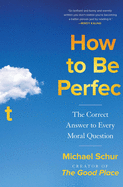
A timely and entertaining guide to sharpening one's moral compass, How to Be Perfect: The Correct Answer to Every Moral Question by Michael Schur ponders ethical predicaments both modern and ancient, real and hypothetical, in a splendidly novel fashion, deploying both the author's trademark irreverent humor and centuries-old philosophical theory to uncover what it takes to be a good person and lead an ethical life. As Schur explains, How to Be Perfect is an account of his journey through moral philosophy and learning to accept and even embrace failure as a necessary and beneficial by-product of our efforts to try to mindfully improve how we move through the "minefield of modern life."
An acclaimed television writer and creator of the fantasy comedy The Good Place, Schur was inspired by his research for the television series and the experiences that led to his own ethical evolution for his cleverly presented book debut. As he tells it, the more we practice being good, the easier and more instinctive it becomes. By breaking down the basic tenets of ethical theory into manageable morsels and applying them to real-life situations that are part and parcel of membership in modern society, How to Be Perfect equips readers with the practical skills to confidently build their own personalized ethics toolbox.
The book is organized broadly around three secular theories of Western moral philosophy: virtue ethics, deontology and utilitarianism, with engaging and thoughtful forays into Jean Paul Sartre's philosophy of existentialism, Buddhism and the southern African concept of human interconnectedness known as ubuntu. Schur encourages readers who are so inclined to dig deeper and explore the many other fascinating theories of moral philosophy that have developed over 2,500 years. Ethics is free for all to engage with, he says, and it boils down to four simple questions that we can ask ourselves whenever we encounter any ethical dilemma, great or small. These questions comprise "moral philosophy and ethics in a nutshell," namely: What are we doing? Why are we doing it? Is there something we could do that is better? Why is it better?
Echoing themes from The Good Place, Schur plunges into spiky ethical questions that readers will likely find familiar, including whether we should lie and tell a friend we like her ugly shirt, the one she plans to wear to a job interview, and if we can still enjoy Woody Allen movies despite his morally problematic past. One of the most ubiquitous modern-day dilemmas, whether we have to return our shopping cart to the cart corral, is explored through the lens of "contractualism," a theory developed by the American philosopher T.M. Scanlon that suggests we apply the standard of reasonableness to evaluate our actions and also what we owe one another as part of a thriving society. Adding a healthy dose of humor, Schur deconstructs philosopher Immanuel Kant's theory of duties and obligations known as deontology, as well as the results-oriented theory of utilitarianism, and applies them, with his own special touch, to the famous thought experiment known as "the Trolley Problem" that has plagued philosophy students since the '60s. These same theories are utilized to evaluate the social and ethical issues arising from the Covid-19 pandemic, including American attitudes toward mask-wearing and vaccine mandates.
Schur distills Aristotle's dense and expansive teachings and his theory of virtue ethics into a lively discussion on the desirable traits of kindness, generosity, courage and the author's personal favorite, being dutiful. The goal of mankind and the very purpose of living, stated Aristotle, is to flourish, which the author interprets to mean attaining "a sense of completeness that flows through us when we are nailing every aspect of being human." In questioning how we can acquire desirable virtues in just the right amount to flourish, Schur exposes an essential aspect of the human condition that has been neglected by philosophers past and present, concerning the varying real-life circumstances that make it far more difficult for some people to engage with ethics than others. Context matters, he insists, and those who are fortunate enough to live comfortably bear more responsibility to behave ethically and at a higher standard than those struggling to survive.
Moving beyond applicable theories, How to Be Perfect grapples with the reality of "moral exhaustion," a phrase coined by the author to capture the reality that most of us face of having too many moral and ethical decisions to make, on top of our everyday problems and commitments--from which products to buy or use to what is the most responsible way to shop for groceries. Schur emphasizes the importance of checking in with oneself once in a while to assess the current state of our ethical health and the critical skill of learning to apologize when we have done something wrong. With the hard-won confidence of someone who has tried, failed and tried better, he reassures readers that we are bound to fail at being good sometimes and that is fine as long as we care about becoming better people.
Schur concludes with a heartfelt letter to his children, encouraging them to reflect on their decisions, interrogate their ethical instincts and develop a good balance of virtues. His enthusiasm for the subject of ethics is contagious. Accompanied by a robust and often hilarious notes section, the conversational, chucklesome tone of How to Be Perfect renders moral philosophy, a subject that has intimidated mankind for centuries, joyfully accessible to readers at every stage of their lives and is sure to animate intergenerational dinner table conversations exploring the universal human desire to be good. --Shahina Piyarali

